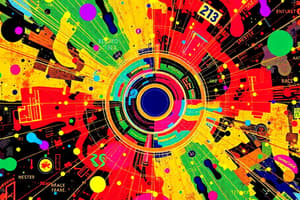Podcast
Questions and Answers
What is the primary purpose of a hypothesis in scientific research?
What is the primary purpose of a hypothesis in scientific research?
- To summarize previous research findings
- To provide a definite answer to a research question
- To propose a testable explanation for a phenomenon (correct)
- To establish a fixed conclusion
Which of the following best describes a control group in an experiment?
Which of the following best describes a control group in an experiment?
- The group that is observed without treatment (correct)
- The group that is manipulated to test the hypothesis
- The group that receives the experimental treatment
- The group that provides data for statistical analysis
What role does data analysis play in the scientific method?
What role does data analysis play in the scientific method?
- To collect data without influencing the results
- To present findings in an academic format
- To formulate hypotheses for future studies
- To determine the validity of the hypothesis based on evidence (correct)
Which statement regarding peer review is accurate?
Which statement regarding peer review is accurate?
In an experiment, what is the independent variable?
In an experiment, what is the independent variable?
Flashcards
String
String
A sequence of characters enclosed within single or double quotes, used to represent text data.
Function
Function
A program that can be reused multiple times in different parts of your code.
Variable
Variable
Variables are like containers that hold data. You can give them names and store different types of information in them.
If statement
If statement
Signup and view all the flashcards
Loop
Loop
Signup and view all the flashcards
Study Notes
Introduction to Quantum Computing
- Quantum computing leverages the principles of quantum mechanics to perform calculations, unlike classical computers that use bits.
- Quantum computers use qubits, which can exist in multiple states simultaneously (superposition) and exhibit entanglement.
- These properties allow quantum computers to potentially solve problems intractable for classical computers.
Qubits and Quantum Superposition
- Qubits are the fundamental units of quantum information, analogous to bits in classical computing.
- A qubit can exist in a superposition of both 0 and 1 states simultaneously, unlike a classical bit which is definitively 0 or 1.
- The probability of a qubit collapsing into a 0 or 1 state when measured is determined by the quantum state or wave function.
Quantum Entanglement
- Entanglement is a quantum phenomenon where two or more qubits are linked in such a way that they share the same fate, regardless of the distance separating them.
- Measuring the state of one entangled qubit instantaneously determines the state of the other, even if they are far apart.
- Entanglement plays a crucial role in quantum algorithms, enabling parallel computation and correlations beyond classical limits.
Quantum Gates
- Quantum gates are analogous to logic gates in classical computing; they manipulate the quantum state of qubits.
- These gates perform transformations on the superposition states of qubits, creating complex quantum states.
- Different types of quantum gates exist, each performing specific transformations, which are crucial in designing quantum algorithms.
Quantum Algorithms
- Quantum algorithms exploit quantum phenomena like superposition and entanglement to solve certain problems more efficiently than classical algorithms.
- Examples include Shor's algorithm for factoring large numbers and Grover's algorithm for searching unsorted databases.
- These algorithms demonstrate the potential power of quantum computing for specific problem domains.
Quantum Hardware
- Quantum computers are physical devices composed of various components.
- The physical implementation of qubits varies, including trapped ions, superconducting circuits, and photonic systems.
- Building stable and scalable quantum hardware is a considerable technological challenge.
Limitations and Challenges
- Quantum computers are still in their early stages of development.
- Maintaining the fragile quantum states of qubits, known as decoherence, and controlling their interactions are significant hurdles.
- Developing error correction methods is crucial for building reliable quantum computers.
- Scalability is a major challenge in building quantum computers with a large number of qubits, needed for complex computations.
Applications and Potential Impacts
- Quantum computing holds promise for various applications, potentially revolutionizing fields like drug discovery, materials science, financial modeling, and cryptography.
- The ability to solve complex optimization problems quickly may have a large impact in areas such as finance and logistics.
- Early applications focus on specific problems well suited to quantum algorithms, but broader applications are emerging.
Future Directions
- Continued research focuses on improving qubit stability, reducing decoherence, and building larger, more stable quantum computers.
- Development of more sophisticated quantum algorithms and error correction techniques is underway.
- The integration of quantum computing with classical computing is an area of significant interest to further unlock its potential.
Studying That Suits You
Use AI to generate personalized quizzes and flashcards to suit your learning preferences.




